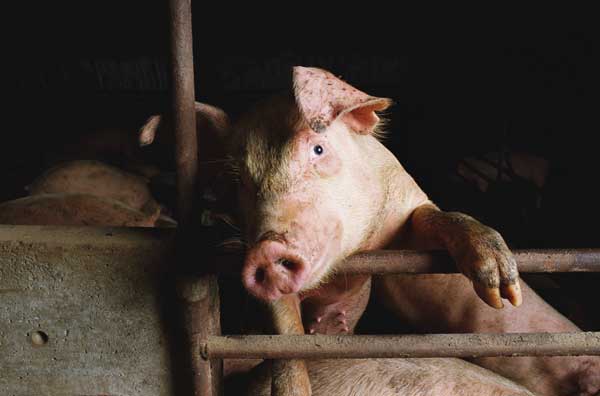
Fall is the time for most county fairs and livestock shows and marks the beginning of rodeo season across the Lone Star State. It also marks the beginning of the flu season, prompting the Texas Animal Health Commission to post warnings about the movement and handling of farm animals, especially swine.
Already this year, the Center for Disease Control (CDC) has warned rural Americans about the spread of the H3N2v (variant) virus. Mostly spread by contact with pigs at stock shows, nearly 300 cases of human H3N2 virus have been confirmed in the U.S. including one death. In 2011, only 12 cases were reported for the year.
While the heaviest outbreaks are occurring in Ohio and Indiana, the Southwest is not safe from a virus outbreak.
Since July 2012, there have been outbreaks of H3N2 variant viruses with the matrix (M) gene from the 2009 H1N1 pandemic virus in multiple U.S. states. Investigations into H3N2v cases indicate that the main risk factor for infection is prolonged exposure to pigs, mostly in fair settings. Found in U.S. pigs in 2010 and humans in July 2011, this virus appears to spread more easily from pigs to people than other variant viruses.
The only death so far occurred in an older adult with multiple underlying health conditions who reportedly had direct exposure to pigs in a fair setting. While limited person-to-person spread of this virus has been detected and likely continues to occur sporadically, no sustained community transmission has been found so far. CDC says they are monitoring the spread of the virus and are working with states to respond to evolving outbreaks. The agency continues to urge people at high risk from serious flu complications to stay away from pigs and pig arenas at fairs this fall.
"We’re saddened to hear about the death of one person in Ohio associated with the current H3N2v outbreaks," says CDC’s Dr. Lyn Finelli. "Like with seasonal flu, we have been – and continue to be – particularly concerned about people with factors that put them at high risk of serious complications if they get the flu. These people should absolutely not have contact with pigs or visit pig arenas at fairs this summer."
Dr. Finelli is Lead for the Surveillance and Outbreak Response Team in CDC’s Influenza Division.
High risk factors for serious flu complications include being younger than five years (especially children younger than 2 years), or 65 and older, pregnancy, and certain chronic medical conditions like asthma, diabetes, heart disease, weakened immune systems, and neurological or neurodevelopmental conditions. A full list of high risk conditions is available on the CDC seasonal flu website.
"Anyone with a high risk factor should not only avoid pigs and pig arenas at fairs, but they should also seek prompt medical attention if they get flu-like symptoms, especially if they have pig exposure, but even in the absence of pig exposure," Finelli says.
For seasonal flu, CDC recommends that it is best that people with high risk conditions who develop flu-like symptoms contact their doctor, tell them about their symptoms, and remind them about their high risk status. For the current H3N2v outbreaks, if high risk people have exposure to pigs, it’s especially important that they tell their doctor about this exposure."Like with seasonal flu," Finelli says, "prompt antiviral treatment in a high risk person can mean the difference between having a milder illness versus a very serious illness that could result in a hospital stay or even death," says Finelli."This message is critical not only for people who are at high risk, but for America’s doctors who are treating these patients. We want their suspicion for H3N2v to be high right now. Ask patients with influenza-like-illness if they have pig exposure, but regardless of whether they do, if they have a high risk factor, treat them empirically with antivirals for influenza without waiting for testing results."
Simple recommendations
Here are some simple recommendations from TAHC to help keep you and your animals healthy:
If anyone in your family has flu-like symptoms, please do not attend fairs/exhibitions for 7 days after symptoms begin or until you have been fever-free for 24 hours without the use of fever-reducing medications, whichever is longer.
If any of your pigs show signs of flu-like illness on the farm, check with your veterinarian before bringing your pigs to the fair/exhibition.
While at the show, follow these simple precautions to protect yourself and others:
Wash your hands often with soap or use an alcohol-based hand cleaner, especially after you cough or sneeze or have contact with animals.
Cover your nose and mouth with a tissue when you cough or sneeze. If a tissue is not readily available, use your elbow joint to minimize hand contact.
Avoid touching your eyes, nose or mouth.
Do not eat or drink near animals or animal pens.
During the fair/exhibition, monitor your pigs for any signs of illness and report any illness to the veterinarian on-call.
When you come home from a fair/exhibition, be sure to quarantine your hogs, disinfect your trailer and equipment (show boxes, feed pans, etc.), and watch for any illness in your pigs.
About the Author(s)
You May Also Like




